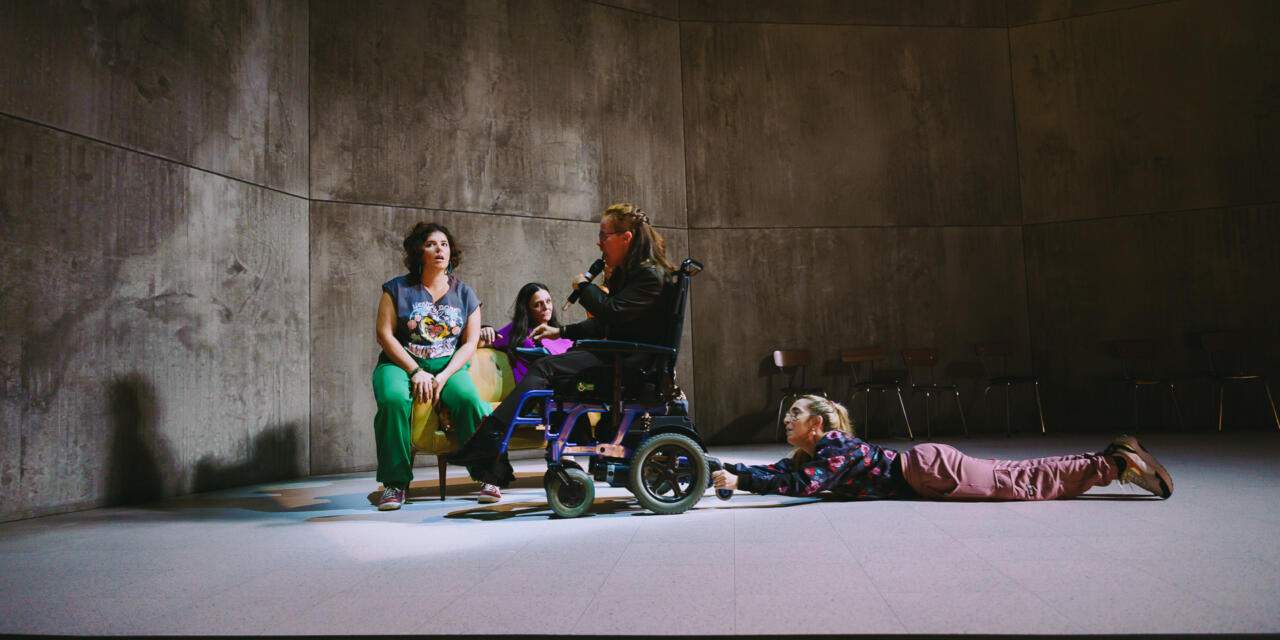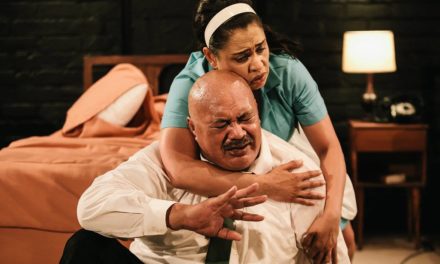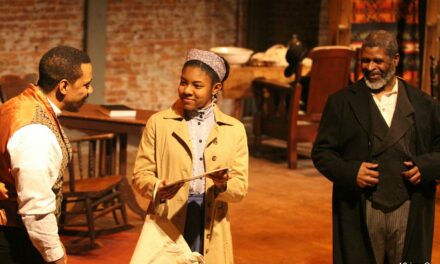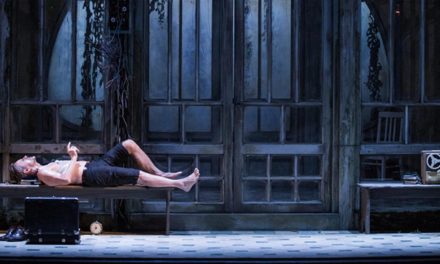There is nothing easy about Alberto San Juan’s Lectura fácil. His adaptation of Cristina Morales’ prizewinning novel, published in English by Penguin as Easy Reading in 2022, follows the novel’s fragmented format, charting the adventures of its four blood-related protagonists: Marga (Carlota Gaviño), Nati (Estefanía de los Santos), Patricia (Pilar Gómez) and Ángeles (Anna Marchessi). Nati and Patri are sisters, and cousins to Marga and Ángeles – they are thick as thieves and protective of each other. Episodes from their past are narrated through the course of the piece, but much remains unsaid. All are differently abled characters with learning differences which are never named but which manifest in different ways. All have a story to tell about their journeys through the system and all are determined to make it their own way on their own terms however difficult this might be.
When the play opens, Marga, Nati, Patricia and Ángeles have been living in Madrid under the guardianship of social services – the novel’s action has been moved by San Juan from Barcelona to Spain’s capital city. Social Services have petitioned the courts to have Marga forcibly sterilised and she has run away. She enjoys sex with others and with herself; she likes it often and she really doesn’t mind if it is in public or not. Her frequent masturbation in public spaces isn’t seen as acceptable behaviour and Social Services think that enforced sterilisation should put a stop to it. The action revolves around the four women providing evidence to the Judge that must make the decision on Marga’s future; this narrative line is juxtaposed with a series of monologues that show how they got to Madrid and how they have been treated by a system that is ostensibly there to protect them.
San Juan’s adaptation never tries to sanitise Morales’s novel – the author was notoriously displeased with the miniseries Fácil (Easy) directed by Anna R. Costás and released in late 2022. Instead, he provides an in-yer-face adaptation that merges monologues to the audience with scenes showing the four women at home and in their encounters with social workers, a psychologist, and a dance teacher. San Juan also introduces two men with diagnosed cognitive and/or physical disabilities who are part of the welfare group they are part of: Antonio (played by Pablo Sánchez) who is obsessed with the fifteenth-century humanist Antonio de Nebrija and Ibrahim (Marcos Mayo) whose idea of freedom involves dancing freely in a nightclub without being the subject of the gazes of others. The men’s disabilities are never named or identified but Ibraham’s cerebral palsy makes his wish to dance until he drops particularly poignant and the production’s deployment of actors with physical disabilities ensures that the conditions that they describe never feel abstract or invisible.
For Desirée Cascales, in the roles of the Judge and Desi, getting in and out of her wheelchair is no easy manoeuvre but she moves with an elegance and fluidity – part of the choreography by Iniciativa Sexual Feminina (the dance company that Morales is part of alongside Elisa Keisanen and Elise Moreau) that allows certain emotions and responses to be played out in gestures and movement. Cascales’s monologue – on intersectionality as a disabled woman having to deal with double discrimination – is stirring and heartfelt. The actor overrides the character with their lived experience holding the stage to tell her story on her terms.
Class comes into play in a series of intricate ways. Ángeles’s mother worked as a sex worker and gave birth to her daughter at 48. Taken in by her uncle Joaquín on her mother’s death, Social Services are dismayed that there is no bathroom in her uncle’s home. A bathroom, Ángeles observes, is a luxury only the puticlub (brothel) has. Nati, Patri, Marga and Ángeles wear the poverty they were born into, it has marked and shaped them as much as their disabilities. Madrid represents a new life for the women, new possibilities but as Ángeles demonstrates with her incisive and persistent questions, the past is not so easy to shake off and these women live in a society where the system doesn’t really understand what a second chance means.
The production is raw, funny and brash. The actors speak to the audience in character – sharing thoughts, dreams, wishes, and fears. Ángeles holds the stage brilliantly – clutching the microphone with determination as she insists she is the lead character, refuses to concede on telling her story her way, and avoids judging anyone she comes into contact with. Ángeles brings a forensic attention to detail to her dissection of the situations she encounters; she is never in a hurry — time is an elastic commodity — but she knows her rights and knows what she wants, and this is never more in evidence than when she is called to give evidence to the Judge on Marga. When her questions as to whether there will be an easy reading rendition of the transcript and proceedings is met with a plethora of evasive answers before the definitive ‘no’ from the court clerk, she decides not to give evidence. Her encounter with the judge is a skillful dissection of how power operates and what it means to try and challenge its institutional operation. Easy reading — a form of plain English that avoids the passive voice and opts for simplicity in sentence construction — is a way of better understanding the world for Ángeles and on this she is not prepared to compromise. Anna Marchessi brings a wry calm to Ángeles. Patri may be frustrated that she spends so much time on her phone but Ángeles has a purpose: to write a novel in easy reading on WhatsApp for people like her to enjoy and understand.
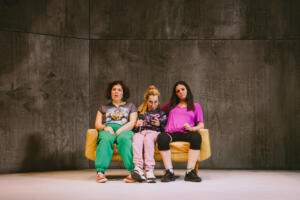
Carlota Gaviño (Marga), Anna Marchessi (Ángeles) and Estefanía de los Santos (Nati) in “Lectura fácil” Photo: Luz Soria
One of the production’s strengths is the care with which the different characters are delineated – each captured with different rhythms and linguistic nuances. Patri tries to fit in, to keep a tidy home and ensure that Social Services are ‘pleased’ with the quartet; she wants to integrate. Pilar Gómez brings a nervy energy to Patri whose leopard skin leggings, orange cropped top, clipped back mass of long curls, and gold hoop earrings give her a larger-than-life presence. Her desire to please is learned behaviour and all too often her irritation and frustration explode when she feels the authorities aren’t listening, leading to a glut of contrite apologies. Her sister Nati (in Estefanía de los Santos’s edgy performance) has anger management issues that have had her sectioned. Nati is a forceful presence doesn’t want others imposing their views on her. And then there is Marga who is seen masturbating in the play’s opening moments and whose sexual urges are just part of who she is and how she lives her life.
San Juan has introduced some new elements to his adaptation: the characters of Ibrahim and Antonio provide outsider elements generating new scenarios for the quartet — Antonio’s nervy energy contrasting with Ibrahim’s calmer presence. Sánchez also doubles as the unreadable Uncle Joaquin. Desire is at the forefront of the production whether it be sexual – as with Ibrahim’s encounter with Nati or Nati’s with Marga – and the production doesn’t shy away from the explicit either physically or verbally. Beatriz San Juan’s grey concrete-walled set evokes a prison-like space with high windows – escape always out of grasp. The sofa is both a space of complicity – the women gather there in solidarity as a force to be reckoned with — and a space of observation. A series of chairs at the back of the stage further allow the actors to watch and listen to the monologues that each of the characters have. Raúl Baena’s lighting is dramatic – delineating the performative ethos of the production. Footlights are deployed as Antonio delivers his monologue, suggesting something of a vaudeville act – the issue of who is performing for whom is never far from the piece’s surface and provides an uncomfortable comment on nineteenth-century “freak shows”. Only here the characters want to remain in control as they tell their stories their way. All reflect at some point on how they are expected to “perform” – and all resist it both consciously and unconsciously to different degrees. Music is upbeat and brash – much like the staging itself. The overriding sense is of the audience witnessing a rehearsal – characters nodding and signalling as if to encourage each other to take the stage. At times it is as if the fiction is ruptured — the tension lending the action a certain fragility. There are so many times where the world of these women threatens to fall apart but never quite does; and that is testament to the world created by Morales that San Juan and his creative team have brought to the stage with such candour.
Lectura fácil opened at Madrid’s Centro Dramático Nacional on 18 November 2022. It runs at the Teatre Lliure’s Sala Fabià Puigserver until 23 April and at Murcia’s Teatro Romea on 5 May.
This post was written by the author in their personal capacity.The opinions expressed in this article are the author’s own and do not reflect the view of The Theatre Times, their staff or collaborators.
This post was written by Maria Delgado.
The views expressed here belong to the author and do not necessarily reflect our views and opinions.

